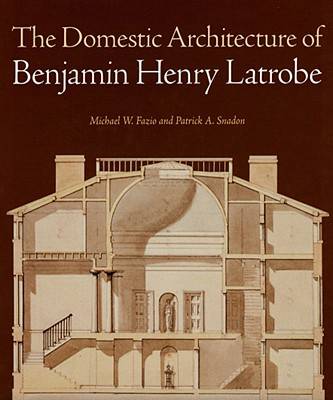
- Retrait gratuit dans votre magasin Club
- 7.000.000 titres dans notre catalogue
- Payer en toute sécurité
- Toujours un magasin près de chez vous
- Retrait gratuit dans votre magasin Club
- 7.000.0000 titres dans notre catalogue
- Payer en toute sécurité
- Toujours un magasin près de chez vous
The Domestic Architecture of Benjamin Henry Latrobe
Michael W Fazio, Patrick A SnadonDescription
Winner of the Publications Award given by the Southeast Chapter of the Society of Architectural Historians and an Honorable Mention in the Architecture and Urban Planning category of the Professional and Scholarly Publishing Awards given by the Association of American Publishers
This deeply researched and abundantly illustrated study catalogs all of Latrobe's domestic commissions, offering an authoritative treatment of the concepts, designs, and unique interior and exterior features of his houses.
Benjamin Henry Latrobe, an English émigré and the first professional architect of international stature to practice in the United States, invented an American house type for the new democratic republic. Calling upon his diverse education and travel experiences in Europe and his training with eminent architects and engineers in London, Latrobe responded to American manners and climate by producing what he called his "rational house," an application of Enlightenment thinking to the design of a proper living environment for the citizens of the world's most recent democracy.
Establishing a new benchmark in Latrobe studies, Michael W. Fazio and Patrick A. Snadon extend their analysis to Latrobe's training and career in England and Europe, his principles of design, and his methods of architectural practice. The authors trace the evolution of his design thinking through analytical essays on all of his major domestic commissions and conclude with a summary discussion of his position within the international architectural scene, his design theories, the integration of interior design and engineering into his architectural practice, and the preservation of his houses.
Spécifications
Parties prenantes
- Auteur(s) :
- Editeur:
Contenu
- Nombre de pages :
- 816
- Langue:
- Anglais
Caractéristiques
- EAN:
- 9780801881046
- Date de parution :
- 01-04-06
- Format:
- Livre relié
- Format numérique:
- Genaaid
- Dimensions :
- 240 mm x 283 mm
- Poids :
- 3388 g

Les avis
Nous publions uniquement les avis qui respectent les conditions requises. Consultez nos conditions pour les avis.






